 Children sorting waste at the recycling station. Photo: Förskolan Stallet
Children sorting waste at the recycling station. Photo: Förskolan Stallet
 Children sorting waste at the recycling station. Photo: Förskolan Stallet
Children sorting waste at the recycling station. Photo: Förskolan Stallet
In Sweden, sustainability is not just a topic - it’s a way of life introduced from the earliest stages of education. Swedish preschools embed sustainability into daily routines and play, helping children understand their role in protecting the planet and caring for others. Rather than isolating the concept in special lessons, it becomes part of how children learn, interact, and make choices. This model offers valuable insight for preschools around the world, showing that even the youngest learners can begin to grasp and practice sustainable thinking.
The Swedish National Curriculum for preschool serves as the foundation for sustainability education through what is known as Education for Sustainable Development (ESD). It is aligned with the Organisation Mondiale pour l'Éducation Préscolaire - OMEP (World Organization for Early Childhood Education), which supports and strengthens preschools' work in sustainable development. The curriculum mandates that preschools promote sustainability across ecological, social, cultural, and economic dimensions. Rather than being treated as a separate subject, sustainability is integrated as a lens through which all learning is approached.
Children’s experiences and ideas guide the learning process, while teachers are expected to foster democratic, inclusive environments that encourage curiosity, critical thinking, and collaboration. Activities are designed to connect children’s everyday lives with broader global issues, helping them understand not only how the world functions, but also how they can contribute to shaping a more sustainable future.
In Swedish preschools, sustainability begins with simple, hands-on activities. Children sort waste into bins labelled for paper, plastic, metal, glass, and food scraps. Playful elements, like colourful “garbage monsters”, help make the process engaging and easy to remember. Composting is also common. Children watch leftover food break down into soil, often discovering worms and insects along the way. These small actions help them understand how nature recycles, and how they can help throughout the process.
These early habits evolve into broader conversations. Older children begin to explore how their actions relate to larger systems - why saving water matters, how turning off lights conserves energy, and what happens when resources are wasted. Teachers gently introduce ideas like resource conservation and climate impact, weaving economic sustainability into these everyday decisions. This creates a foundation for critical thinking about consumption, responsibility, and long-term consequences.
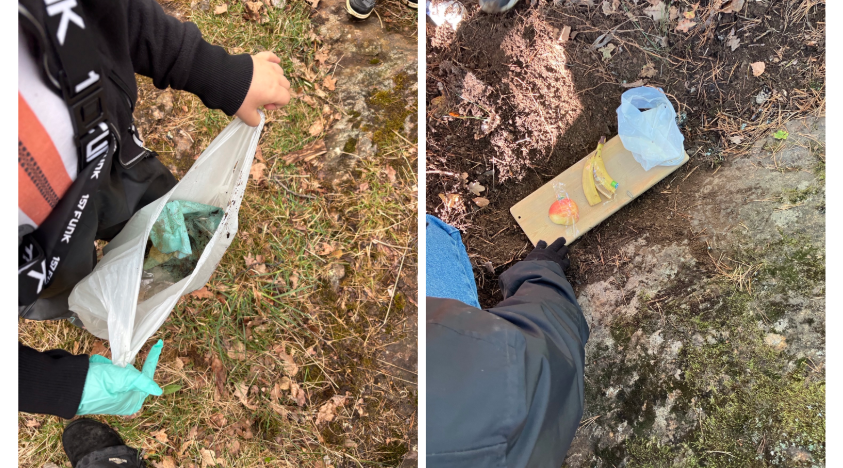
Children collecting garbage in the forest and decomposing organic food. Photo: Förskolan Stallet
Outdoor learning is central to sustainability education in Sweden. Children spend hours outside, rain or shine. They explore forests, observe animals, and care for school gardens. In some preschools, children grow vegetables and herbs, learning how food is produced and why healthy soil, clean water, and sunlight matter. When they harvest what they’ve grown and use it in meals, they understand food as something valuable -not to be wasted.
Caring for animals is also part of the learning experience. Some preschools build insect holes to protect bees. Others study the lives of frogs or ants. These small creatures become a starting point for discussions about biodiversity and ecosystems. Children begin to see the links between humans, animals, and the natural world - and the responsibility we share to protect it. 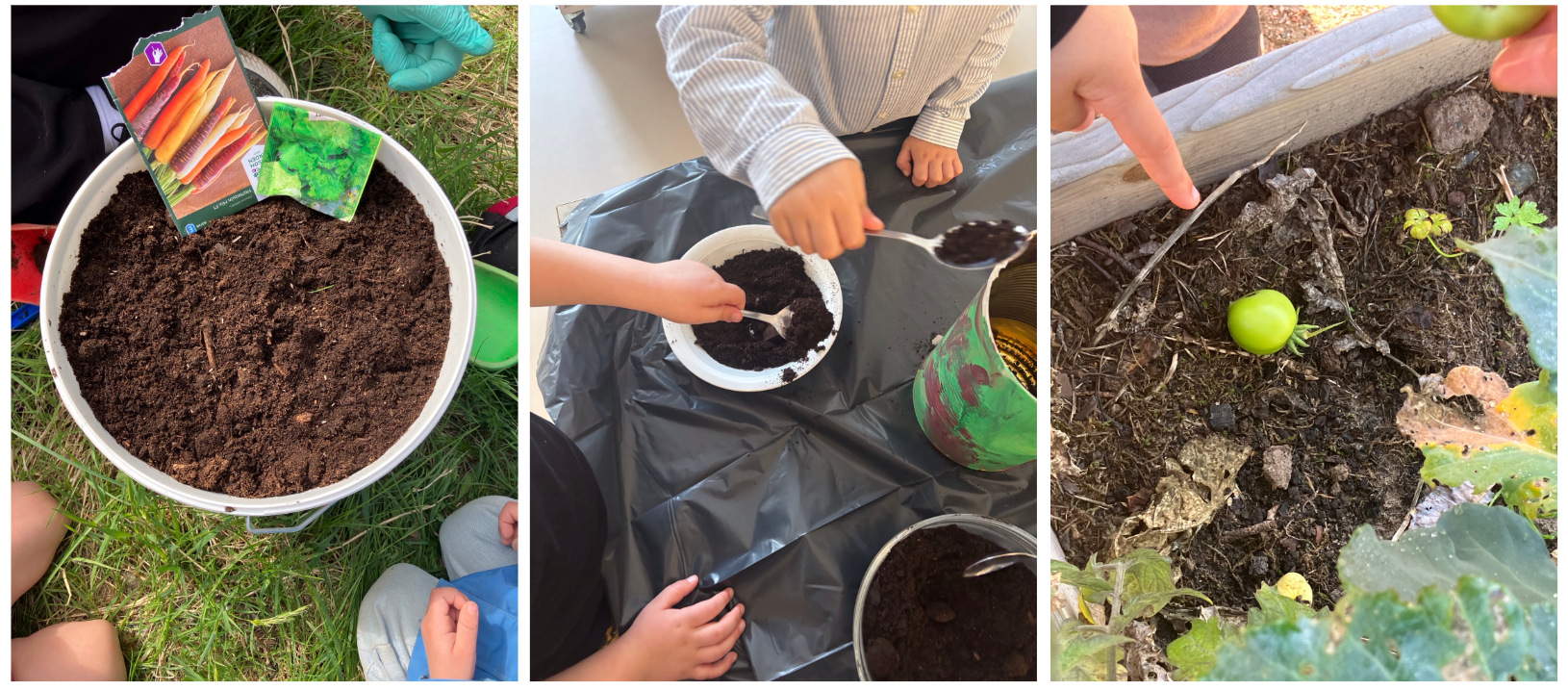
Children planting at the kindergarten. Photo: Förskolan Stallet
In Swedish preschools, sustainability is not limited to environmental practices – it also includes social, cultural, and community values. Children learn about fairness, empathy, cooperation, and inclusion, which are seen as essential for building a just and sustainable society. Teachers support this learning by guiding children through conflict resolution, active listening, and ethical discussions that are age appropriate. These interactions help children reflect on how to live well with others and understand that sustainability includes how we treat people as much as how we treat the planet.
Practical activities aligned with the curriculum bring these values to life. For example, children regularly visit local recycling centres where they sort different types of waste - including hazardous items like batteries and plastics - into the correct containers. These experiences teach children about responsible waste management and highlight the broader social and environmental impact of their actions, reinforcing lessons about community responsibility and ethical behaviour.
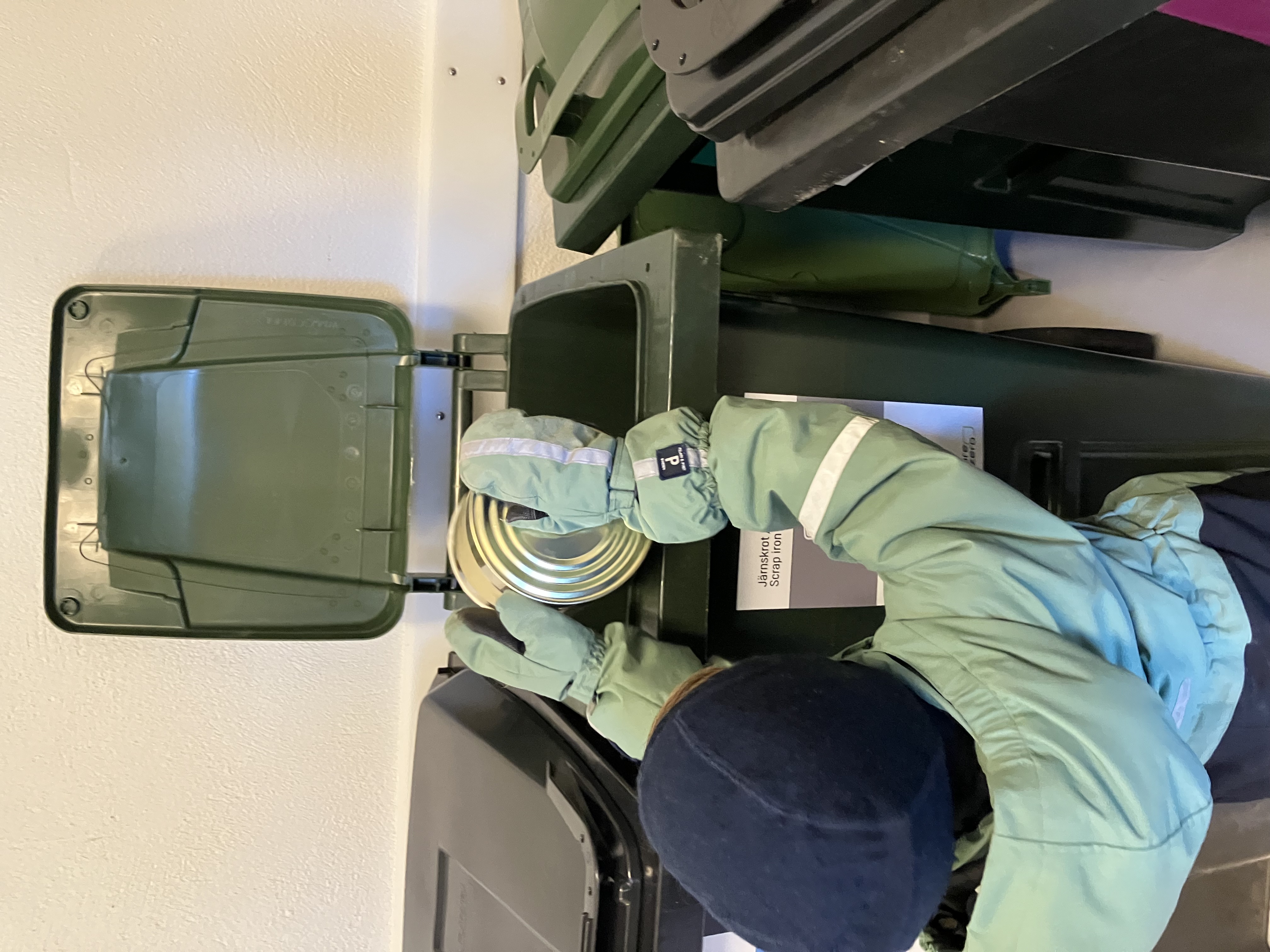
Children sorting waste at the recycling station. Photo: Förskolan Stallet
The curriculum also encourages expanding children’s awareness beyond their immediate environment. Activities like “journey week” invite children to explore cultures worldwide through food, stories, music, and customs. This fosters global citizenship and cultural respect, helping children see the link between local actions and global sustainability challenges. Through these experiences, children learn that their everyday choices – from what they eat to how they treat others and the environment – are part of a larger system that connects people and places across the globe.
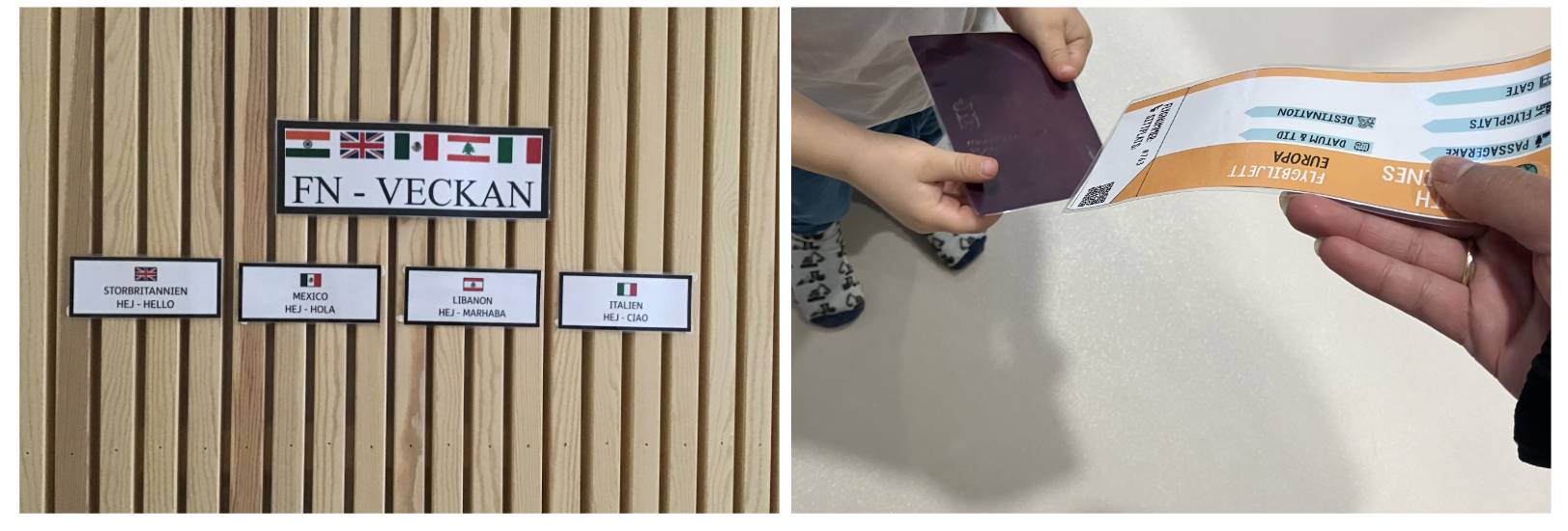
Children “travelling” around the world. Photo: Förskolan Stallet
Bringing all of these dimensions together are the creative projects that make sustainability real and memorable. One example is the “Children’s Voices in a Sustainable Farsta” project, which centers on the fictional Tofsingarna, characters from a children’s book who guide preschoolers through imaginative sustainability missions. These include recycling materials, planting gardens, and engaging in storytelling and dramatic play – all aimed at helping children reflect on how their choices affect the environment and others.
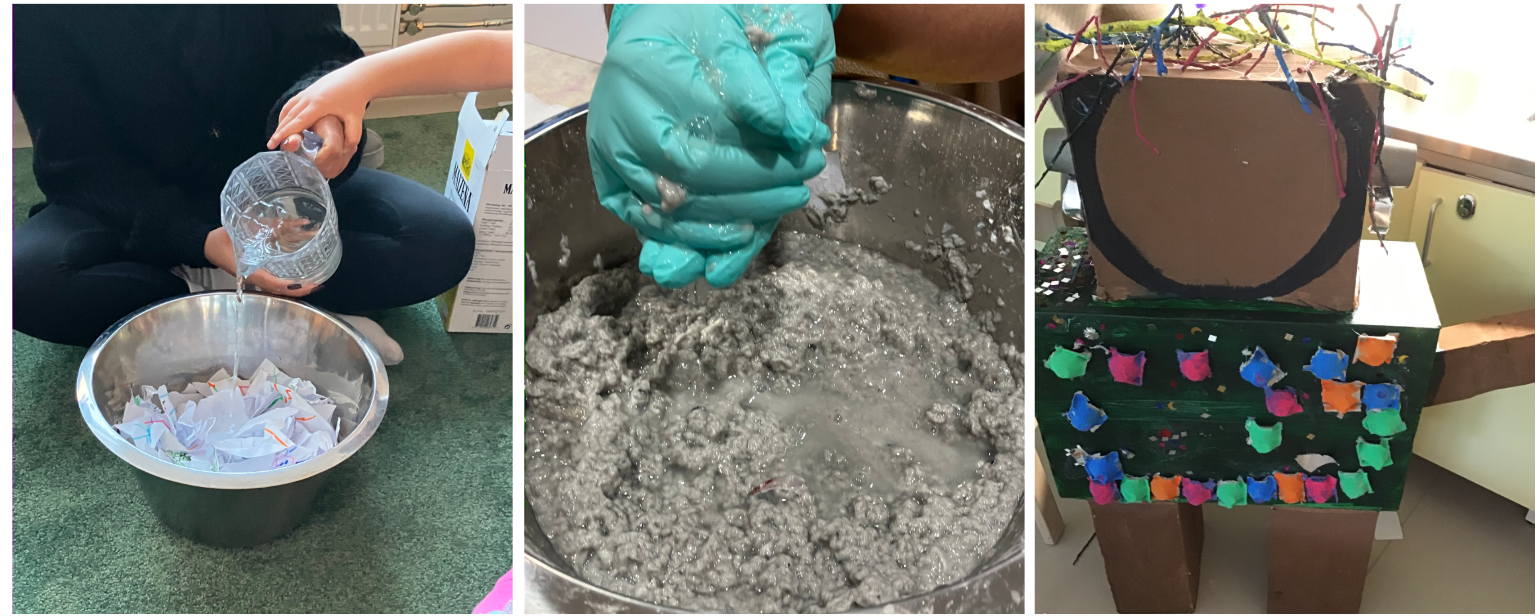
Children and teacher recycling paper. Photo:Förskolan Stallet
While Sweden presents a highly structured and integrated approach, other countries are also developing their own paths toward sustainable early childhood education. In Bosnia and Herzegovina, for example, early childhood education is gradually embracing sustainability through local community efforts. Though a comprehensive national curriculum on environmental education is still in development, many preschools - especially in Sarajevo - are independently cultivating eco-conscious habits among children.
Preschoolers in Bosnia engage in practical activities such as sorting waste into paper, plastic, and food bins, using rainwater to water plants, and turning off taps to conserve water. Clean-up days and art projects made from reused materials are common, and nature walks and park visits foster curiosity and respect for the environment. Children also attend workshops by local ecological NGOs and enjoy storytelling and puppet shows with environmental messages.
Tree planting has emerged as a symbolic and practical initiative in Sarajevo, with schools developing “pocket parks” like the green corner in Hrasno - a neighbourhood in Sarajevo. A growing number of Waldorf curriculum-inspired kindergartens also reflects parents’ desire for nature-based learning. Despite limited resources, these preschools show how even small, joyful acts - like planting a tree or making crafts from recyclables - can nurture future environmental stewards.
Whether in Sweden or in Bosnia, sustainability remains a topic of major interest. Through such projects since early childhood, children experience sustainability as something active and exciting. They are not passive recipients of knowledge but participants in change. Whether making art from recycled materials or planting a tree, they gain confidence in their ability to solve problems and make a difference. These projects align with sustainable goals, addressing economic, ecological, and cultural aspects of sustainable development. More importantly, they speak to children in their own language – through play, curiosity, and creativity.
Swedish preschools demonstrate how, through everyday habits, exploration in nature, global awareness, and imaginative play, children develop not only knowledge, but a mindset of care, curiosity, and action. While each country must find its own path, the Swedish model offers valuable insights: start young, start small, and make sustainability a part of everything. By doing so, we empower children to become thoughtful, compassionate participants in building a better world.
References
All information has been gathered from the curriculum and daily activities at Förskolan Stallet, Farsta, in the Stockholm Region and some information from preschools in Sarajevo Canton.
Discover the News and Updates section, delivering the latest updates and insightful content across various topics. Stay informed with most recent news articles, reports, and publications, of the BiH SuTra project.